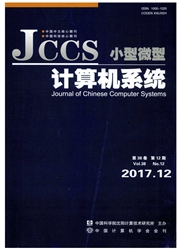

 中文摘要:
中文摘要:
随着RFID技术的发展,RFID的应用越来越广泛.然而,由于RFID硬件设备固有的限制和环境噪声的影响,造成了RFID原始数据的不确定性,使RFID在很多领域中的应用受到限制.现实应用中的部署环境通常由多个阅读器及大量标签组成,而现有的数据清洗算法大多只针对单个阅读器对标签的读取情况进行研究,因此在真实应用中的效果差强人意.本文综合考虑RFID的数据特性、阅读器和部署环境的先验知识以及具体应用中的约束条件三个方面,提出一种更贴近现实应用的基于多阅读器数据冗余的数据清洗策略LC-INFER(Location-Containment Inference):首先基于贝叶斯推理对数据进行初步清洗,其次结合基于物体间包含关系的平滑技术,并考虑约束条件对数据进行二次清洗以提高数据的准确性,最后部署真实供应链应用环境进行实际测试,并用大量仿真数据集进行模拟测试,验证了本文提出的RFID数据清洗算法的准确性及高效性.
 英文摘要:
英文摘要:
With the development of the RFID technology,RFID is widely used in many fields.However,because RFID readings are inherently noisy due to the hardware limitations and the environmental interference,the applications of the RFID are restricted in many areas.The real-life deployment environment generally involves multiple readers and a large quantity of tags.However,recent researches on RFID data cleaning just focus on the readings of single reader,the effect of which can be hardly satisfied in the real applications.This paper provides a new data cleaning strategy—LC-INFER(Location-Containment Inference),which is more suitable to practical applications based on data redundancy from multiple readers.Specially,the RFID data features,prior knowledge about the readers and the environment,and given constraints in target applications are considered.To begin with,we shall clean the natural data of RFID based on Bayesian Inference.In the next section,the second cleaning for data is applied in order to improve the accuracy,using the given constraints combined with smoothing techniques which is based on the containment relationship between objects.Finally,we deploy the real supply chain environment to derive the real-world data.Our experimental results,using both real-world data and large simulated data,demonstrate the accuracy and efficiency of our proposed algorithm.
 同期刊论文项目
同期刊论文项目
 同项目期刊论文
同项目期刊论文
 期刊信息
期刊信息
